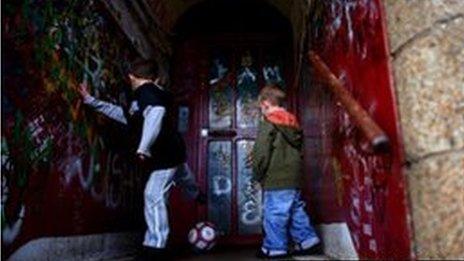Britain's poorest city: The struggle to make ends meet
- Published
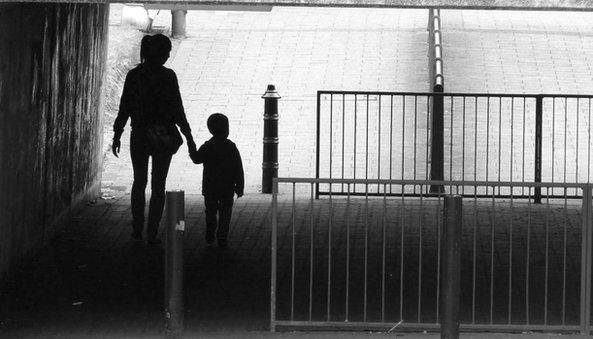
Families living in Nottingham have the lowest household income in the UK
Picture, if you will, a loan shark. A hard-faced, big-booted, macho male perhaps? On the contrary.
The one I am looking at is attractive, in her late twenties, with shoulder-length blonde hair and enough brassy confidence to be talking loudly to her boss on the phone.
"Can we only give a loan to an 'A' or a 'B'? What if their partner is a 'C'?" I cannot help overhearing her, because there are only three of us sitting in the fluorescent-lit, lino-floored pub in the middle of the Meadows estate on the edge of Nottingham.
For many, this part of the country is famous for Raleigh bicycles, Boots the Chemist, Robin Hood or DH Lawrence. Yet Nottingham is also pre-eminent for another, less glorious reason.
Recent statistics from the Office for National Statistics suggest residents of this city have the lowest household disposable income of anywhere in the UK.
The average income per individual householder after tax, but including benefits, is £16,034 a year. In Nottingham it is £10,834.
That may be only one measure of poverty, but at a time when there has been a sustained assault on living standards for everyone it is surely a difficult extreme.
Desperation
Unsurprisingly, the Meadows is fertile territory for doorstep lenders, who like to categorise their clients according to their ability to repay.
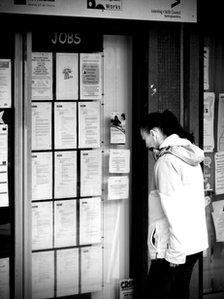
Unemployment in parts of Nottingham is more than 8%
"OK, so it's only 'A's or 'B's, then," says the woman in the pub, as she ends her phone call, picks up her briefcase and steers her way past the lunchtime drunks at the door.
"See you next week," calls the cheery barmaid.
On an estate such as the Meadows, a loan shark is everybody's friend. Sharon Mills, of the Meadows Partnership Trust, later explains why.
"If you are desperate, and the kids have not eaten for three days, if a person comes to the door offering a loan, they'll seem like the Messiah," she says.
But she also describes them as "a pack of wolves", who can resort to intimidation to get their money back.
"They know when your payday is. Then they'll come and kick the door in. It can be that, literally."
'Dressing gowns'
In its time the Meadows has earned many superlatives, all of which suggest that crime, violence, drugs and alcohol are a regular feature of living here.
But it is the persistent lack of money that provides the biggest challenge, and often seems to overwhelm its inhabitants.
I meet Michael, a tall striking man in his twenties.
"I live like I'm in prison," he says.
"I eat nothing but beans on toast, and cups of tea. It's not healthy, but it's cheap."
He spends most days hanging out on the estate.
"Look, it's 3.30 in the afternoon, and you see people out in their dressing gowns. That's depression," says Rachel Oldfield, a 35-year-old single mother, who works part-time as an administrator.
She describes how some of her own black moods tend to occur on payday.
"I'm so looking forward to it. I plan to celebrate with friends, like going out for a meal. But then I have to cancel it, because the money's already gone."
Survival
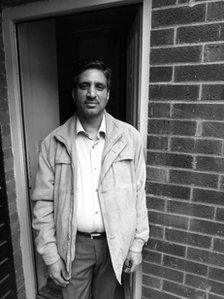
Abdul Haq dreams of having a holiday
Rachel gets paid at the end of each month. By the beginning of the following month, all her salary has already gone on rent and bills. She survives to the next payday on £140 of tax credits and £134 child benefit.
She owes £2,500 in energy bills but is slowly managing to pay that off.
Rachel does not count herself as being poor, though.
As proof, she mentions that her daughter goes to Brownies, and her son plays football.
She says she is fortunate compared with many others living in the Meadows.
"There are kids on my street whose parents don't own a car, who don't go anywhere, ever."
But coping with unexpected expenses can be difficult. She admits to driving her car for a week without an MoT certificate when she could not afford the £54 test fee.
"It was a week before payday. And without the car, I can't work."
Luxuries
One of the most telling signs of poverty is the scarcity of treats or luxuries, such as a weekend away.
Abdul Haq came to live in the Meadows in 1973.
He has arthritis and diabetes, and survives on disability living allowance. Like everyone here, he dreams of escaping to somewhere else.
"I haven't been on holiday for six years," he tells me.
"I'd love to go somewhere warm, but it is not possible. I have to make do by walking around here."
Rachel Oldfield maintains that the secret of coping with poverty is to be flexible about what you really need.
"If you can't change what you need, if you have to have cigarettes or alcohol, that's when you really will be fighting poverty."
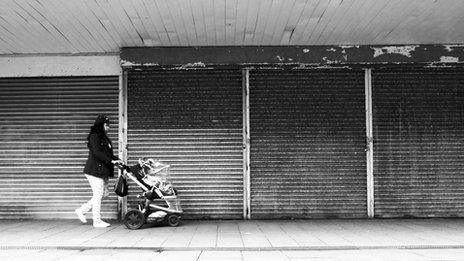
Few people living in the Meadows enjoy any luxuries at all
Aspirations
There is some good news in the Meadows.
A new food bank has opened and that means there is less shoplifting.
"Shoplifting for basics - milk and bread - has gone down since the food bank started," says Sharon Mills.
"Because if your kids are hungry, you will go stealing," she insists.
But optimists here are few and far between.
David Gretton, of the Meadows Advice Group, is worried about the impact that the benefits changes last month will have.
"In three or four months we are going to see an increase in bailiffs because people haven't paid the council tax," he says.
Sharon Mills believes the squeeze on people's incomes this year will continue to make life tougher.
"I've never known it so bad, even in the 1980s," she says.
"There is a breaking point. Clients are being pushed over the edge. They're suicidal."
Rachel Oldfield says she is hanging on for the moment when things improve. But her aspirations have limits.
"I live in the Meadows. So I am realistic about who we are and what we can do."
Yet some people who work here do have aspirations for the estate.
A large banner by the shopping centre proclaims that the Meadows, against all odds, is a finalist in this year's Britain in Bloom competition.
If the herbs planted out there prove as hardy as some of its residents, and if roses can flourish here, among the concrete and despair, then the Meadows will surely win that challenge outright.
- Published16 May 2013

- Published27 April 2013
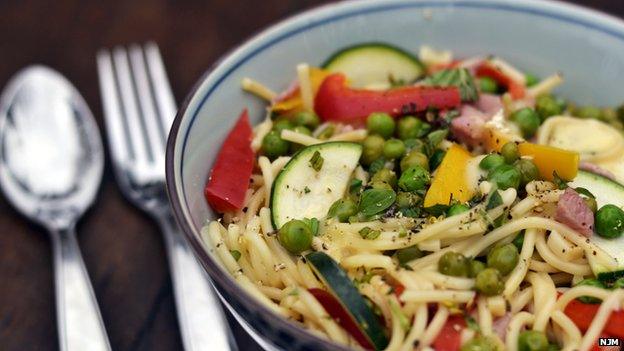
- Published20 February 2013
